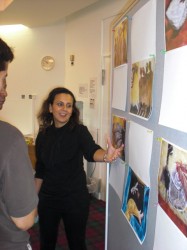Preparation by participants
 It will help greatly if learners can take time to prepare themselves before the event, unless it is a short exposure event to generate interest in further learning. In addition to helping to clarifying learning outcomes (above), there are a number of other ways that learners can be encouraged to prepare themselves, for example:
It will help greatly if learners can take time to prepare themselves before the event, unless it is a short exposure event to generate interest in further learning. In addition to helping to clarifying learning outcomes (above), there are a number of other ways that learners can be encouraged to prepare themselves, for example:
Questions. Ask them to respond to 2-3 simple questions in advance, and/or to identify a key issue or case study that can be used to deepen and apply their learning. This could relate to a current challenge, issue or relationship linked to their roles and responsibilities. Learners can be asked to answer these briefly in advance, or come to the event with some responses in hand.
Sample questions, which can be adapted, are as follows:
- What are the one or two biggest challenges you face in your work, in improving the quality of participation… in your organization, in relations with other actors?
- What issues of power arise in your work, either for you personally, within your group, community, team, department or organization, or in your relations with other external actors?
- What is a case study or example which represents these challenges? (which you can use to deepen your understanding and practice with methods of power analysis)?
Experiences
Ask learners to think about one particular moment in their life or work when they felt either powerful, powerless or empowered, and to be prepared to tell this story when they come. If writing and journaling are familiar to learners, this can be given as a writing exercise in advance. This can also be done in the event itself, and further ideas for this are given below.
Case studies
Experiences can be focused on particular themes and issues if desired, and prepared more in the form of case studies (e.g. using Question 3 above). A short template or set of questions can be used so that case studies cover the same kinds of issues.
Readings
Advance readings may be provided, for example selected from those listed in this resource pack. Pick readings that are accessible and understandable to the learners or a selection that meet the range of different learners’ abilities. Think about language and abilities, length, practitioner v. academic language, case studies, etc. Provide a few guide questions with the readings.
Concept note
It can be a good idea to provide a short concept note or paper that sets out some of the key issues and questions being addressed, or puts the learning event, outcomes and themes in the context of learners’ needs.
The information on this page was adapted from Irene Guijt and Jethro Pettit’s Learning Trajectories on Power for NGO staff designed for PSO and Oxfam-Novib (Netherlands), 2007 and 2008, and from Rosemary McGee’s preparation for workshops on power with Christian Aid, 2009.

